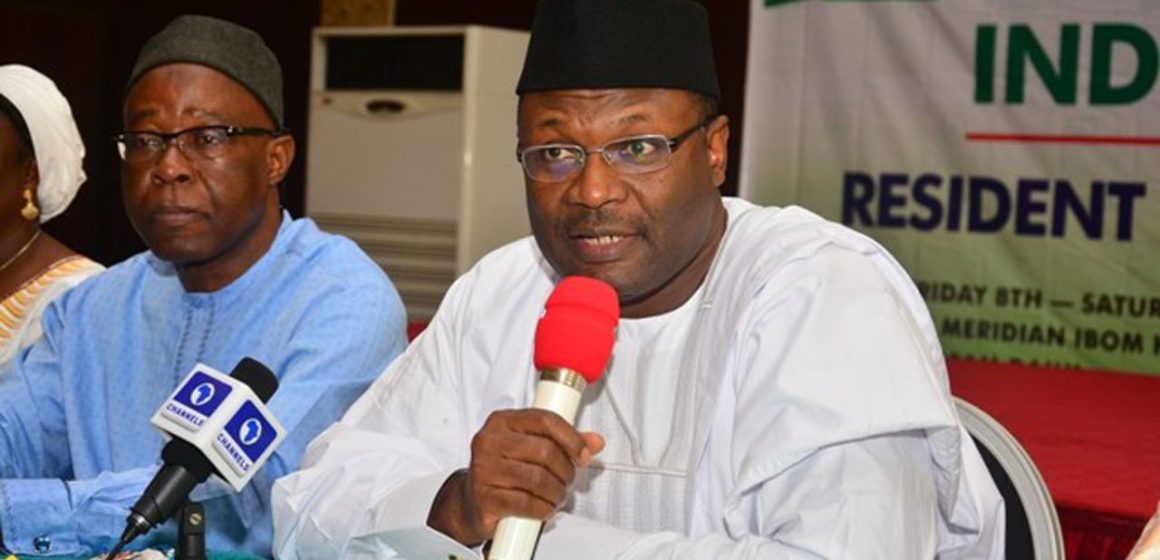The Independent National Electoral Commission will today have a crucial meeting with the leadership of the 18 registered political parties under the auspices of the Inter-Party Advisory Council.
Sources said that the meeting, scheduled to hold at the commission’s Headquarters in Abuja at 3.30pm would dwell on the ongoing primaries for 2023 election.
Also to be discussed is the demand of parties seeking the review of the timetable and schedule of activities for the 2023 general election.
However, it was not yet clear as at the time of this report if INEC would after today’s meeting accede to the demands of the parties by adjusting the timetable.
The two major political parties, All Progressives Congress and Peoples Democratic Party have scheduled their presidential primaries for this weekend.
INEC had reviewed its schedules for the 2023 general elections in Nigeria in February after the President, Major General Muhammadu Buhari (rtrd.), assented to the 2022 Electoral Act.
In compliance with the new Electoral Acts, the commission fixed April 4 to June 3 for the election of flag bearers of all political parties for the 2023 elections.
But political parties under the aegis of IPAC and political actors have continued to mount pressure on the commission to extend the June 3 deadline for the primaries.
The civil society organisations and prominent Nigerians, including a former chairman of INEC, Prof. Attahiru Jega, have warned the commission against yielding to the demands of the political parties.
Jega said shifting the deadline would be a recipe for disaster.
IPAC, during a parley with the INEC held earlier this month urged the commission to shift the deadline by 37 days.
The chairman of IPAC, Yabagi Sani, accused the commission of not carrying leadership of political parties along while designing the timetable and schedule of activities for the 2023 elections.
Sani said the Sallah holiday, forthcoming Ekiti and Osun States governorship elections and screening of an unprecedented large number of aspirants were issues that could hamper timely and strict compliance with the timetable.
A chieftain of the APC, Gbenga Olawepo-Hashim, had accused INEC of endangering the conduct of the 2023 general elections with what he alleged to be its “plots and partisan interests”.
While warning of looming danger from the “tight INEC schedule of primaries imposed on political parties in the country”, he said the commission’s schedule “has been influenced purely by a section of the political elites who have positioned themselves to benefit from this INEC calendar.”
According to him, it was not the business of INEC to fix dates of primaries in as much as the primaries were conducted 180 days before the election in accordance with the provision of extant law.
But responding, the Chief Press Secretary to INEC Chairman, Rotimi Oyekanmi, said the extant laws give INEC the power, as a regulator of political parties, to determine when party primaries should take place.
Oyekanmi told journalists that the extension being sought by parties, if granted, would disrupt the planning template for the 2023 general election with dire consequences.
He said, “The timetable and schedule of activities for the 2023 general election was released as far back as February this year, one full year ahead of the election. The conduct of primaries was fixed for April 4 – June 3, 2022.
“The extant laws, indeed, give INEC the power, as a regulator of political parties, to determine when party primaries should take place, contrary to the gentleman’s view. It is quite obvious that he has not read the Electoral Act, which is quite disappointing)
“The INEC Chairman had, on at least three occasions, urged the political parties to conduct their primaries within the stipulated timeline, as no extension will be entertained.
“The extension being sought, if granted, would disrupt the planning template for the 2023 general election, with dire consequences.
“Why is it that the parties cannot conduct their primaries within two months (April and May)? Interestingly, none of them complained about the timeline for party primaries when the timetable was released in February. Why now?”
The Special Assistant to the INEC chairman, Prof. Muhammed Kuna, said contrary to Olawepo-Hashim’s
assumptions, the timetable for the primaries was carefully deliberated upon in the commission with the full knowledge of the various critical activities the commission has to conduct before the 2023 general elections.
These, he said, included the printing and display of the list of nominated candidates, printing of results sheets, movement of ballot papers among other activities.
“Just imagine the number of candidates and pages that have to be printed for each candidate for all 18 parties, for all constituencies for the election (executive and legislative at Federal and State levels); the printing of ballot papers (for all registered voters for all constituencies (1 presidential, 109 Senatorial, 360 Federal Constituencies, 28×2 Governorship and Deputy Governorship; and 993 State constituencies); the printing of results sheets and the movement of ballot papers, results sheets and related election materials and personnel to location”, he stated.
Kuna added that timeline for the primaries was fixed to enable the completion of these and related critical tasks that cannot begin until parties submit their nominees.
The INEC chairman, Prof. Mahmood Yakubu said any attempt to review the timeline as requested by IPAC will alter the rest of the INEC schedule of activities ahead of the 2023 polls.
He insisted that the commission has given enough time for parties to conduct primaries to select their candidates for the poll.
“I hereby reiterate the position of the Commission that there will be no review of the timelines. There are so many inter-related activities that are associated with the timelines which must be carried out.
“Any review to extend the timeline for one activity will affect other activities and put unnecessary pressure on political parties and the Commission. This will ultimately result in more complications than what the extension seeks to achieve. Therefore, the Commission will not review the timelines,” Yakubu told leaders of the political parties in attendance.



Leave a Reply